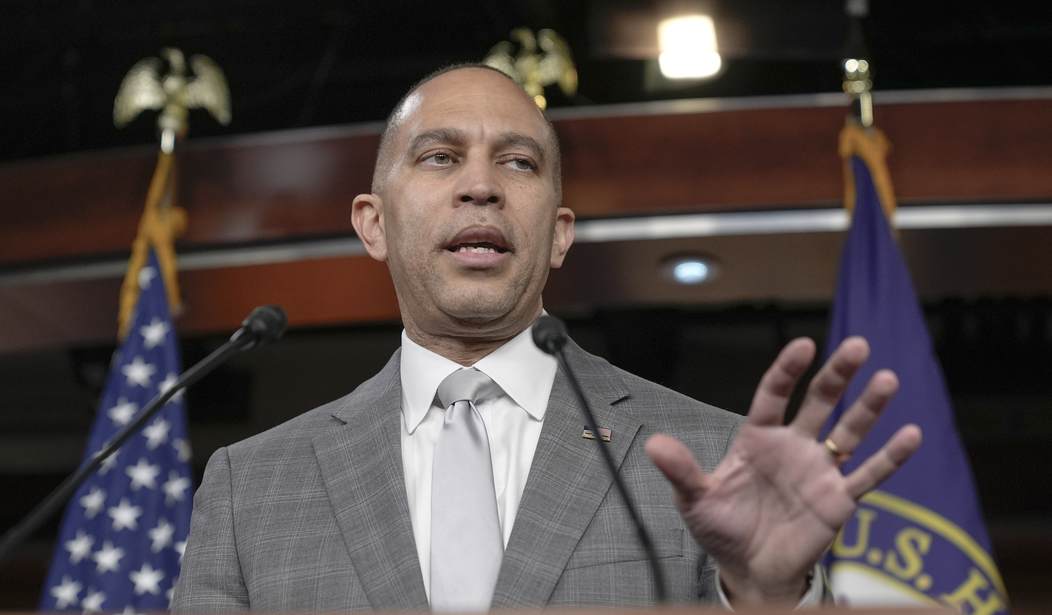When the Democrats rode to the rescue to save the political skin of House Speaker Mike Johnson (R-La.), they cemented their role as the majority party. Every move Republicans make from now on will have to be cleared with the "co-speaker" Democratic leader Hakeem Jeffries (D-N.Y.).
And since the Democrats are far more united than Republicans, it is Democrats who control the agenda.
How this state of affairs came to be isn't hard to figure out. Republicans took careful aim, checked the wind, breathed a prayer for accuracy...
And then shot themselves in the foot. The marksperson responsible for this clusterrfark is Rep. Marjorie Taylor Greene (R-Ga.). She and about a dozen GOP House members decided to act as if they were in the minority and blow up the majority and Mike Johnson's agenda. They voted against routine rules to move legislation to the floor. They impeded legislation supported by a majority of their caucus, and they endlessly threatened to get rid of Johnson if he made one wrong move.
Johnson made that move with the Ukraine aid vote. Greene didn't like it and decided to trigger her long-standing threat to vacate the speaker's chair, which, ordinarily, would have set off another unseemly fight for a new speaker.
But a miracle occurred. Democrats decided they liked Johnson in the speaker's chair and rather than take the chance of Republicans choosing someone even more conservative than Johnson, they voted against Greene's motion.
This unprecedented action has turned the House upside down. And it was only made possible by Greene's obstinant insistence that she had a corner on wisdom in the Republican Party.
Democrats are trying not to celebrate too much, but it's hard not to.
“Even though we’re in the minority, we effectively have been governing as if we were in the majority because we continue to provide a majority of the votes necessary to get things done,” Jeffries recently told CBS’s “60 Minutes.” “Those are just the facts.”
Indeed, whether it's government funding, Ukraine and Israeli aid, or tax cuts, the votes of Democrats have been decisive in getting the measures passed.
Democrats’ latest flex — 163 of them opposed the move to topple Johnson — caps a long stream of cooperation with Johnson and many of their Republican colleagues to pass legislation with a more moderate bent than would otherwise be expected from a conservative majority.
Many members were impressed by the trust on display for Jeffries and his lieutenants during a recent caucus meeting in which Democrats discussed saving Johnson. Several Democrats stood up to express their hesitancy in keeping Johnson, who many decried as an election denier for his objections to the 2020 election. But they also understood how Jeffries arrived at the decision to help maintain order in a chaotic House.
Naturally, Greene was unhappy with the failed vote to unseat Johnson.
“I think today has proven the uniparty is alive and well, and the Democrats now control Speaker Johnson. That was something that everybody’s suspected all along. They just voted to save him,” she said after her failed effort to oust Johnson.
Well, that's certainly news to Johnson that "everybody suspected" he was being secretly controlled by the Democrats. Probably news to the Democrats, too.
Greene and other members of the Incendiary Caucus are marginalized — at least for the time being. They can still make trouble for Johnson on the question of rules votes and some other partisan issues. And the Democrats are not going to rush in to save Johnson again. They don't have to. Because of the razor-thin Republican margin, they may end up being in the majority in some cases anyway.
In fact, it’s already happened twice when more Democrats were present and voting than Republicans on days where two-thirds of lawmakers were needed to pass noncontroversial bills. House Democratic leaders have discussed what they would do if such a scenario were to present itself again, denying they would try to exploit their numbers to install Jeffries as speaker. Instead, Democrats would look to sink floor votes on partisan measures or motions to adjourn, according to people familiar with those conversations.
Their strength in numbers played out when the GOP’s first effort failed to impeach Homeland Security Secretary Alejandro Mayorkas in February. Without telling Johnson about their internal whip count, Democratic leadership staff wheeled Rep. Al Green (D-Tex.) onto the House floor in hospital scrubs days after he had surgery, making him the decisive vote that momentarily halted the effort to remove Mayorkas. Even Republicans lauded Democrats’ ability to ensure their all members were present and voting.
With that kind of unity, Republicans don't stand a chance.










